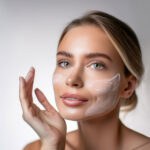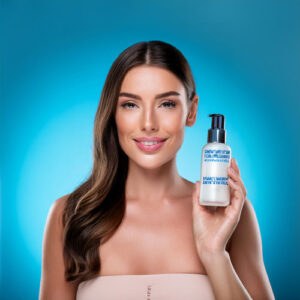
About BB Glow Treatment – Updated 2024
Semi-permanent foundation – BB Glow Can you imagine waking up every morning with a perfectly even skin without any red spots or other imperfections? What

What are peptides and what do they do to your skin? You’ve likely heard a lot about peptides, right?
It is an anti-aging must-have product and a hero ingredient to smooth, repair, and moisturize skin – but have you ever thought what a peptide is in general? What exactly does it do to our skin?
So, let’s find it out, shall we?
Peptides are one of the most talked-about ingredients in anti-aging skincare. In fact, they look like short chains of amino acids that participate in building vital proteins such as collagen, elastin, and keratin.
As you may already know, these proteins are the foundation of our skin and are responsible for their texture, strength, and resilience. Without peptides, our skin might become less protected and more vulnerable, which can lead to loss of firmness, wrinkles, and a visible change in skin texture.
When applied to our skin, peptides act as little messengers, triggering skin cells to perform specific functions such as building collagen and elastin, encouraging the skin to look younger and fresher.
Recent scientific researches have proven that peptides can support your skin on multiple levels such as firming, soothing, and hydrating.
So, peptides bring remarkable benefits, revitalizing your skin, and making it stronger and more resilient.
Types of peptides
There are four types of peptides that you should know about – just in case!
This type of peptides inhibits acetylcholine release by a variety of chemical interactions and that is why they are added to cosmeceutical products to reduce wrinkles. The most extreme neurotransmitters include poison Curare and Botulinum toxin (Botox).
Less invasive versions have been developed for use on skin and the hypothesis is that they inhibit the repetitive contraction of the muscles of facial expression thereby forcing them to relax. These neurotransmitter inhibitor peptides have been shown to reduce certain types of wrinkles by approximately 30% overall.
These peptides are added to skin cosmetics due to their ability to stimulate skin fibroblasts and produce more collagen, elastin, and other proteins in the matrix of the dermis.
Boosting these structure proteins makes skin look firmer and fuller. GHK is an example of a signal peptide and it was one of the first peptides discovered. It was originally isolated from human plasma in the early 1970s and it’s wound healing properties were first observed in the mid-80s, which just goes to show that this technology is relatively new.
These peptides deliver trace elements, like copper and magnesium, which help with wound repair and enzymatic processes.
These trace elements have been shown to improve procollagen synthesis, skin elasticity, and overall appearance. For example, a copper complex is made of amino acids glycine, histamine, and lysine and is used in the treatment of diabetic neuropathic ulcers. These are sometimes called “penetrating peptides” or “membrane transduction peptides.” GHK-Cu, which is a copper carrier, has been used for firming skin.
Enzyme inhibitor peptides can reduce the breakdown of collagen and other proteins by interfering with processes that break down those proteins. For example, some enzymes (such as MMP or Matrix Metalloprotease) degrade structural proteins like collagen.
A peptide derived from rice proteins can inhibit the activity of the MMP enzyme and thus keep more collagen around. Peptides derived from soy proteins can also work to inhibit enzymes, specifically proteases. They may have some potential for inhibiting hair growth and reducing pigmentation.
Benefits of peptides:
– Improved skin barrier
The skin barrier may get damaged from over-exfoliation, cigarette smoke, pollution, or even poor sleep. The remarkable property of peptides is that they help build up a stronger barrier.
– Reduced wrinkles
Peptides work in connection with collagen which can plump skin and lips. And when the skin is firmer and plumper, wrinkles and fine lines will be less visible or even disappear.
– Firmer skin
In addition to collagen, peptides also make up elastin fibers, another type of protein. These fibers make skin look firmer and smoother.
– Calmed inflammation
Peptides can help ease inflammation, repair damaged and tired skin, and even out skin tone for the perfect appearance.
Cleared breakouts
Some peptides are antimicrobial – it means they can kill the bacteria that may cause acne.
Recommended Products:
Peptides are definitely worth being added to your skincare routine!
Matrigen, Dermaheal, and ELOHA are the most powerful brands containing peptides presented at Beautifox.
On our website, you may find Korean eye patches containing peptides. They have shown an amazing effect in reducing wrinkles, fighting eye-bags, and rejuvenating the skin.
Also, peptides are an essential part of various anti-aging ampoules and lipolitics on the Korean market.
What’s more, using a serum or moisturizer that contains peptides will lead to firmer and younger-looking skin.
By the way, you have absolutely nothing to worry about – peptides are considered totally safe!
So, as you see, peptides are definitely worth being added to your skincare routine!
They can penetrate the outer layer – so instead of sitting on top of the skin, they sink in deeper. As we’ve already mentioned, you may imagine they are sort of messengers for the other cells that send signals telling the cells to produce collagen and elastin.
And that’s what will deliver you youthful, firm, hydrated, and glowing skin day by day!

Semi-permanent foundation – BB Glow Can you imagine waking up every morning with a perfectly even skin without any red spots or other imperfections? What

Everything you need to know about Hyaluronic Acid. Are you aware of the main reason of early aging and wrinkles? Let’s talk about it